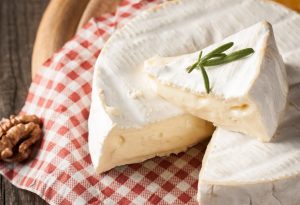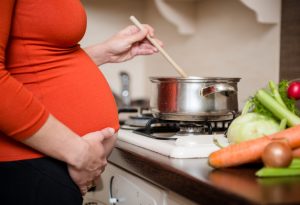In this Article
Food aversions and cravings are a part of every woman’s pregnancy story. A craving is defined as ‘an uncontrollable urge to eat a food item’. You might crave one food for a few days and then develop an aversion to it a couple of weeks later. This is normal during pregnancy and nothing to worry about. However, some foods are considered unsafe for pregnant women and others that must be consumed with a great deal of moderation and caution. One such food is cheese. Read on to find out more about pregnancy cravings for cheese and how to deal with them.
What Causes Pregnancy Craving?
One explanation is that the hormonal changes the body goes through leads to pregnancy cravings. Another thought is that pregnancy cravings are a signal that the body needs nutrients. For instance, if your body lacks Vitamin C, you might develop a sudden fondness for citrus fruits like oranges and grapes. When this happens, pregnancy cravings can also cause you to eat too many unhealthy foods. An example is when you crave something sweet; you are more likely to reach out for chocolates than apples or berries which are far healthier while at the same time satisfying your craving. Here are some common pregnancy cravings and their causes:
- Spicy food or pickles: This might be your body asking for more salt to balance out the high sugar in your bloodstream.

- Apples: Cravings for apple are commonly found in women with a high-fat diet as the pectin in apples helps to balance cholesterol levels.
- Ice cubes: A craving for ice cubes is believed to be caused by a deficiency of iron.
- Peanut butter: Your body might lack vitamin B, and this could be why you are craving peanut butter.
Craving for Cheese
Quite a few pregnant women crave cheese when pregnant. This is an indication that your body needs some extra protein and calcium to nurture your baby. It is best to satisfy these cravings with hard cheeses as well as dairy products like skimmed milk and even Greek yoghurt. While cheese is a rich source of calcium that is necessary for the development of your unborn baby, it can also have an adverse impact on your digestion leading to constipation if consumed in excess.
Is it Safe to Eat Cheese During Pregnancy?
Being a rich source of calcium along with protein and Vitamin B, cheese can help fulfil your daily nutritional requirements and aid in the development of your baby. But there are different types of cheeses available, and of these, some are not recommended for pregnant women. Some varieties, especially the softer variety can be unhealthy as they can contain microscopic organisms called listeria which lead to a condition called listeriosis. By choosing the right kind of cheeses, you can satisfy your cravings and avoid health issues.
Varieties of Cheese to Eat
The unsafe cheeses are usually made from raw and unpasteurised milk which tend to have a higher concentration of listeria bacterium. If you do not know which milk the cheese has been made from, then it is best to refrain from consuming it. Here are some of the different varieties of cheese to eat and to avoid when pregnant.
Safe
All kinds of hard cheeses are deemed safe during pregnancy along with some of the other cheeses. You can satisfy your pregnancy cravings by consuming one of these:
- Hard Cheeses: These have a long maturation period and are firm in texture. They are normally made from pasteurised milk or cooked at extremely high temperatures which eliminate the danger of any bacteria being present. Cheddar, parmesan, paneer, and provolone are some varieties you can reach out for.
- Processed Soft Cheeses: Such cheeses have a soft and flexible texture but can also be watery or runny. Soft cheeses made from pasteurised milk can be safely eaten by pregnant women. Cheese spreads, cottage cheese, cream cheese, mozzarella, and ricotta, come under this category.
- Processed Cheeses: Made from modified natural cheeses, these might contain stabilizers, emulsifiers, and other additives. Since these cheeses are made with a method that involves heating, they are safe for pregnant women. But they rate low on the healthy eating scale due to the higher sodium content than natural cheeses.

Unsafe
There are some cheeses that you must avoid during your pregnancy. These are primarily soft cheeses and include:
- Unpasteurized Cheeses: Pasteurization is a process that kills listeria. So, milk that has not been pasteurized might contain these bacteria. Feta, queso fresco, and Chabichou are some such cheeses. Blue-veined cheese like Roquefort, gorgonzola, and dolcelatte are also best avoided.
- Mould-Ripened Soft Cheeses: The moulds with which these cheeses are made might harbour listeria, and so it is best that you do not eat these. Brie, blue brie, and cambozola are some examples.

Can You Eat Goat’s Cheese?
Goat milk is a nutritious addition to any diet given the number of vitamins and minerals in it. It has fewer calories than cow’s milk and is a good alternative for those allergic to cow’s milk. However, goat cheese is a different story altogether. Known as chevre, this is a soft cheese made from moulds. It is commonly used in restaurants and is an ingredient in many types of cheese salads. This type of goat cheese should be avoided as it can cause Listeria. However, some recipes use cooked goat’s cheese, and this is safe for you when pregnant. Hard cheeses made from goat’s milk can also be eaten safely during pregnancy.
Does Eating Cheese Cause Listeria?
Listeria is a type of bacteria that is found in soft cheese and unpasteurised dairy products. Even if one variety of cheese has listeria in it, there is no way for you to know this. This is because the cheese will not smell or taste any different from cheese that is not contaminated. That said, there are quite a few other situations in which listeria thrive, and there is no way you can avoid all of these. Besides unpasteurized milk, listeria is present in vegetables and fruits that have not been washed well, raw meat, raw fruits and veggies, deli meats, and hot dogs. Listeria is also found in water and soil with many animals carrying this bacterium.
Complication of Listeria
Symptoms of listeria may show up anytime from two days to two months after exposure. In healthy adults, there may be no symptoms at all while in pregnant women the symptoms might be mistaken for that of flu or cold. Symptoms include fever, headaches, muscle aches, chills, nausea, vomiting, stiff neck, and confusion.
Listeria can have an adverse impact on a pregnant woman as well as her unborn child. It might not always make you seriously ill, but the infection needs to be treated immediately.
- The bacteria can affect the placenta or the amniotic fluid resulting in a miscarriage or stillbirth.
- In some pregnant women, listeria can lead to complications like bacterial meningitis and septicemia.
- Some infected babies might be born prematurely. Other babies infected in the womb might develop blood infections, fever, skin sores, and lesions on various organs or infections like meningitis that impact the central nervous system.
- At late-onset listeriosis, the baby appears fine at the time of birth but may start showing signs of infection after days or weeks of delivery. This happens when the infant has become infected during labour due to the presence of the bacteria in the cervix or vagina of the mother.
The prognosis of babies infected with listeria is not very bright as many succumb to the infection or suffer long-term health issues. According to a study, listeria infection has a fatality rate of 20 to 30 percent. If detected early, it can be treated with antibiotics that can result in full recovery. Not all babies with mothers infected with listeria will develop problems.
Tips to Prevent Listeria
It is true that cooking tends to kill listeria. However, this is a very resilient strain of bacterium that can also breed in your freezer or the refrigerator. So, taking precautions to avoid ingesting this bacterium is how you can stay safe when pregnant. Here’s how you can do this.
- Be sure to wash your hands well after you’ve been out. Scrub with soap and if soap is not available use a hand sanitizer.
- Get only pasteurised dairy products
- If you must eat soft cheese, cook it till it boils and consume it immediately. Do not refrigerate it after cooking.
- Cook all meats such as poultry, lamb and fish well before eating

- Reheat leftovers thoroughly before consuming.
- Don’t keep food beyond its expiration date and this applies to cheeses also.
- Clean kitchen sponges and dishcloths regularly as they can be a breeding ground for listeria.
There is no way you can prevent cravings during your pregnancy or even control the type of food you crave. While cheese cravings might not be the best or safest, being cautious about what cheese you eat can stand you in good stead. Read the label and make an informed choice if you must satiate your cheese craving. Try to distract yourself from your cheese craving by keeping your mind and body occupied when the desire hits you. Go for a leisurely walk or listen to some music till the craving passes.
Listeria bacterium is so common that it might not be possible to avoid exposure fully. So, be sure to contact your doctor if you notice any unusual symptoms when pregnant.
Disclaimer: This information is just a guide and not a substitute for medical advice from a qualified professional.









